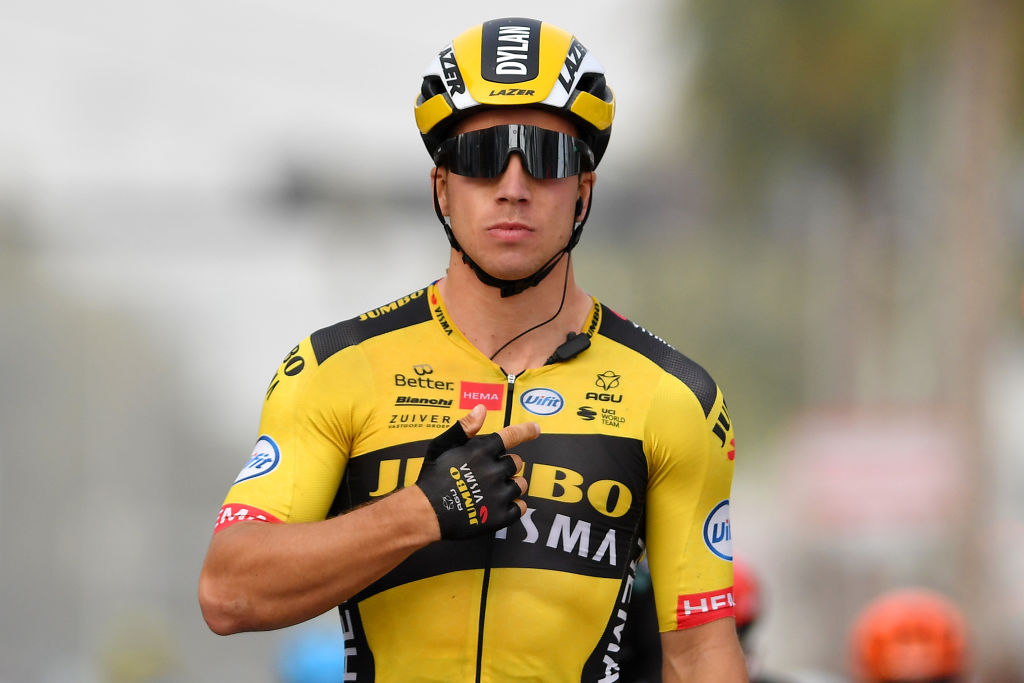Groenewegen received police protection after death threats
Dutch sprinter reveals the backlash from Jakobsen sprint crash at Tour de Pologne

Dylan Groenewegen has revealed he was given police protection amid a wave of hate mail and even death threats following the Tour de Pologne crash that left Fabio Jakobsen with life-threatening injuries.
In an interview with Dutch magazine Helden, the Jumbo-Visma sprinter recounted how one package delivered to his home contained a noose for him and his partner to hang their newborn child.
Groenewegen, who sparked the crash when he deviated from his line on the high-speed downhill finish in Katowice in August, was handed a landmark nine-month ban by the UCI in November.
He was quick to express his contrition but now, with Jakobsen back on the bike and making a good recovery, he has revealed the extent of the backlash.
"There were such concrete and serious threats that we called the police a few days after the crash. The following days and weeks the police guarded our door," he revealed.
"We could no longer spontaneously leave the house. If I wanted to go outside for a moment, there was an officer by my side so that nothing could happen.
"We received handwritten letters in the mail, in which even a noose was added with which we could hang our child later. When you read that message and see that piece of rope, you are terrified. That was the deciding factor for me that it could not continue like this. The police immediately took action after seeing those letters.
Get The Leadout Newsletter
The latest race content, interviews, features, reviews and expert buying guides, direct to your inbox!
"Of course that affects you. What happened here? How is this possible? What sick world do we live in? The most crazy things go through your head. Getting out of bed in the morning was quite a challenge in that period."
There has been a great deal of debate surrounding Groenewegen's role in the crash. The UCI immediately labelled his manoeuvre "unacceptable", while Jakobsen's Deceuninck-QuickStep manager Patrick Lefevere publicly launched a legal suit against him.
However, while it is clear Groenwegen's deviation initiated the crash itself, many have argued that the resulting injuries had just as much to do with the way the barriers collapsed on impact, and the high speeds on a finish long seen as dangerous.
Groenewegen received hateful online and took an extended break from social media, but when the abuse reached his home in physical form, it had a major impact on his mental state.
"In the beginning you really feel shock in your body," he said in the Helden interview.
"We have an alarm on our house and it went off exactly during that period. Then you start thinking about the craziest things. We have also had a false alarm a few times - when I had simply forgotten to turn off the alarm in the morning - but then you get scared.
"I also remember that we had dinner with my parents one evening. On the way a car drove behind us. It started to signal and drove diagonally behind us. In the end he overtook us on a road where that was actually impossible. Panic then sets in. Moments later he just turns right and there is nothing wrong. You start to imagine things that are not there at all."
Groenewegen's ban expires in May and he's set to return to racing at the Tour de Hongrie.
Cyclingnews is the world's leader in English-language coverage of professional cycling. Started in 1995 by University of Newcastle professor Bill Mitchell, the site was one of the first to provide breaking news and results over the internet in English. The site was purchased by Knapp Communications in 1999, and owner Gerard Knapp built it into the definitive voice of pro cycling. Since then, major publishing house Future PLC has owned the site and expanded it to include top features, news, results, photos and tech reporting. The site continues to be the most comprehensive and authoritative English voice in professional cycling.